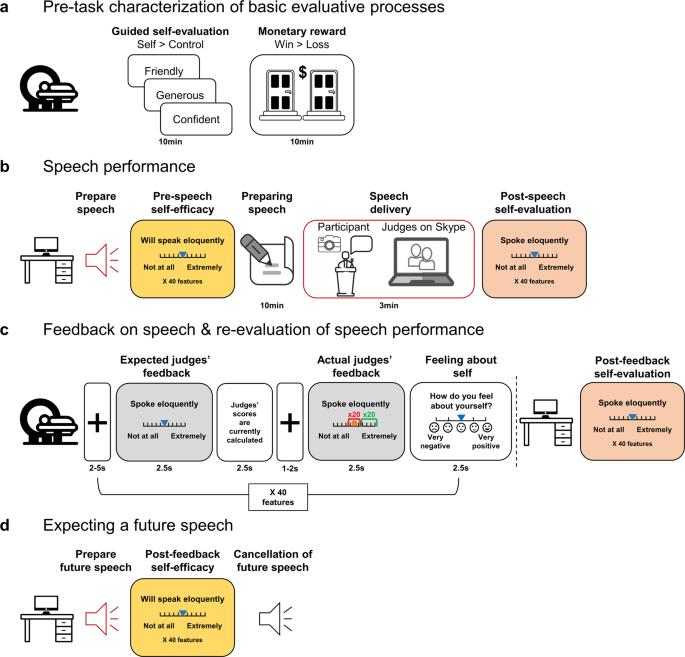A corticostriatal pathway mediating self-efficacy enhancement
引用次数: 1
Abstract
Forming positive beliefs about one’s ability to perform challenging tasks, often termed self-efficacy, is fundamental to motivation and emotional well-being. Self-efficacy crucially depends on positive social feedback, yet people differ in the degree to which they integrate such feedback into self-beliefs (i.e., positive bias). While diminished positive bias of this sort is linked to mood and anxiety, the neural processes by which positive feedback on public performance enhances self-efficacy remain unclear. To address this, we conducted a behavioral and fMRI study wherein participants delivered a public speech and received fictitious positive and neutral feedback on their performance in the MRI scanner. Before and after receiving feedback, participants evaluated their actual and expected performance. We found that reduced positive bias in updating self-efficacy based on positive social feedback associated with a psychopathological dimension reflecting symptoms of anxiety, depression, and low self-esteem. Analysis of brain encoding of social feedback showed that a positive self-efficacy update bias associated with a stronger reward-related response in the ventral striatum (VS) and stronger coupling of the VS with a temporoparietal region involved in self-processing. Together, our findings demarcate a corticostriatal circuit that promotes positive bias in self-efficacy updating based on social feedback, and highlight the centrality of such bias to emotional well-being.

一种介导自我效能增强的皮质纹状体途径
对自己完成具有挑战性任务的能力形成积极的信念,通常被称为自我效能感,是动力和情绪健康的基础。自我效能感在很大程度上取决于积极的社会反馈,然而人们将这种反馈融入自我信念的程度却各不相同(即积极偏差)。虽然这种积极偏差的减少与情绪和焦虑有关,但对公众表现的积极反馈能增强自我效能感的神经过程仍不清楚。为了解决这个问题,我们进行了一项行为和 fMRI 研究,参与者发表公开演讲,并在核磁共振扫描仪上接受虚构的对其表现的积极和中性反馈。在收到反馈之前和之后,参与者对自己的实际表现和预期表现进行评估。我们发现,根据积极的社会反馈更新自我效能感的积极偏差减少与反映焦虑、抑郁和自卑症状的心理病理学维度有关。对大脑社会反馈编码的分析表明,积极的自我效能感更新偏差与腹侧纹状体(VS)中更强的奖赏相关反应以及 VS 与参与自我加工的颞顶区更强的耦合有关。总之,我们的研究结果划定了一个皮层神经回路,它能根据社会反馈促进自我效能更新的积极偏向,并强调了这种偏向对情绪健康的核心作用。
本文章由计算机程序翻译,如有差异,请以英文原文为准。
求助全文
约1分钟内获得全文
求助全文

 求助内容:
求助内容: 应助结果提醒方式:
应助结果提醒方式:


